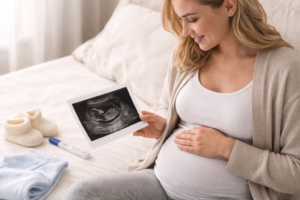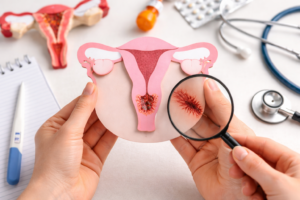Fertility preservation is collective term used to describe the procedures involved in protecting one’s/an individual’s future reproductive possibilities. When a person is diagnosed with cancer, he/she will face multifold trauma – physically, mentally, emotionally and financially.
Often cancer treatments which are lifesaving can be threat to one’s fertility. Even in this crucial period, it is important to know the need of fertility preservation for young age or reproductive age group cancer patients. Fertility preservation at an infertility center will help to improve the quality of life in the future.
Usual queries can be –
1. What is the need of Fertility Preservation for female patients with cancer?
Certain type of cancers in the reproductive tract/reproductive organs can involve removal of the reproductive organs. Cancer treatments like Chemotherapy or Radiation therapy itself might usually tend to affect the reproductive organs resulting in infertility or sterility. Hence before initiating any cancer treatments at the best fertility clinic, those females who are in the reproductive age group or younger age, shall discuss preserving their fertility at a good fertility centre. Ova Fertility & Women Care in Thane provides facility for cryopreserving the gametes or tissues, so that they can have a family in the future.
2. Which factors increases the risk of infertility?
- Type and stage of cancer
- Age at the time of cancer treatment
- Type and dose of chemotherapy
- Location, size of radiation field and dose of radiation
The risk can be high, moderate or low
3. How does cancer treatments impact the fertility?
Cancer treatments can cause temporary or permanent damage to one’s fertility
| Treatments | Consequences on Fertility |
| Surgeries for cancer/s in reproductive tract/organ | · Removal of ovaries, fallopian tubes or uterus resulting in infertility |
| Chemotherapy | · Damage or Destruction to eggs· Prevent full-term pregnancy· Genetic abnormalities |
| Radiation therapy | · Impaired Blood flow to the ovaries and uterus resulting in miscarriage, pre-term delivery, fetal growth restriction· Consequences are based on the location and dose of radiation. Higher the radiation, the effect is detrimental· Early menopause |
4. Is there a possibility of conceiving naturally, after cancer treatment?
Yes, it is possible to conceive naturally after cancer treatment.
Not all women after cancer treatment experience infertility. However, it’s recommended to avoid pregnancy for about 6 months to 2 years post cancer treatment. This duration serves as a recovery period and to assess if there is any recurrence of cancer. The length of this duration varies upon the type of treatment used. But those patients, who have undergone radiation therapy in the pelvis area, might be at the risk of early menopause. They should have regular follow-up consultation with fertility specialist.
5. What are the options of Fertility preservation in women with cancer?
| Treatment stage | Options |
| Before cancer treatment | · Ovarian Transposition – Surgical re-positioning of ovaries out of radiation field.· Radial Trachelectomy – Procedure performed in early stage cervical cancer. Surgical removal of the cervix with the preservation of uterus. |
| During cancer treatment | · Ovarian Supression (Experimental) – GnRH analogs used to suppress ovaries in conjunction with chemotherapy.· Radiation Shielding – Use of shielding to reduce scatter, in conjunction with radiation treatment. |
| Before or after cancer treatment | · Egg Freezing· Embryo Freezing· Ovarian Tissue Freezing· In-vitro Maturation |
6. What are the alternate options available, if the women become infertile post cancer treatment?
Permanent damage to ovaries or uterus post cancer treatment can harm the fertility. In those situations, cancer survivors might have to opt for other alternative to achieve pregnancy like –
- Donor eggs
- Donor embryos
- Surrogacy
- Adoption
- Child-free living
7. Are there any legal implications for storing oocytes or ovarian tissues?
If you are undergoing treatment for cancer, it is important to realize that you may have different immediate and future priorities. You are free to withdraw or vary the terms of your consent at any time.
According to ICMR ART guidelines, you are required to give written consent regarding
- storage of your eggs or embryos or ovarian tissue.
- the length of time it may be stored for.
- the purposes for which your gamete/embryo/ovarian tissue can be used.
- any stated wishes over any embryos created.
- what should happen to your egg/embryo/ovarian tissue sample(s) in the event of your death or if you become incapable of varying or revoking your consent. You may add specific conditions of your choice.
8. How long can I store my oocytes, embryos or ovarian tissue?
The statutory maximum time frame for storing oocytes, embryos or ovarian tissue for medical reasons is 50 years. Every year you will have to renew by paying maintenance cost which is valid for one year.
Ova Fertility & Women Care have a dedicated Oncofertility team to guide you further with any more queries. Connect with their doctors on 70358 01111









 No need to worry, your data is 100% Safe with us!
No need to worry, your data is 100% Safe with us!
1 thought on “Fertility Preservation for Cancer Patients | Ova Fertility & Women Care, Thane”
Hi Neat post Theres an issue together with your web site in internet explorer may test this IE still is the marketplace chief and a good component of people will pass over your fantastic writing due to this problem.